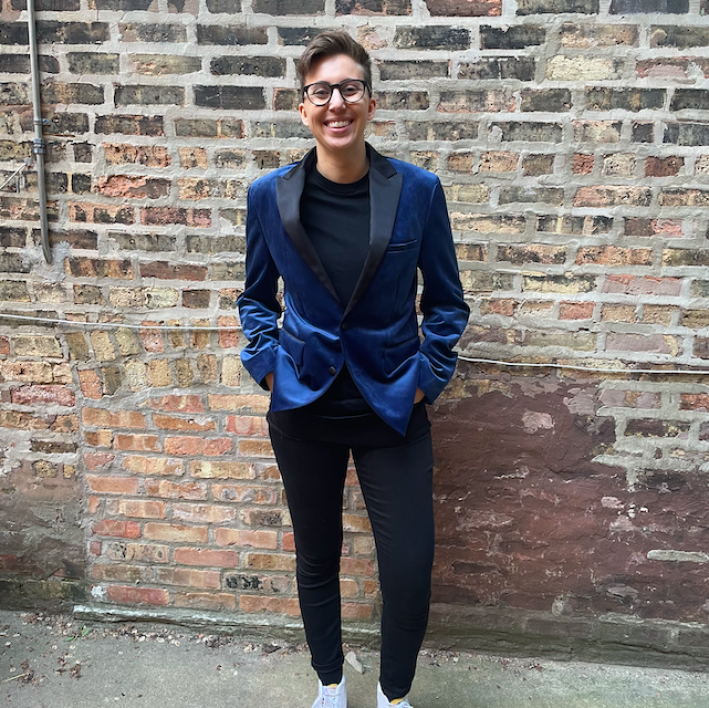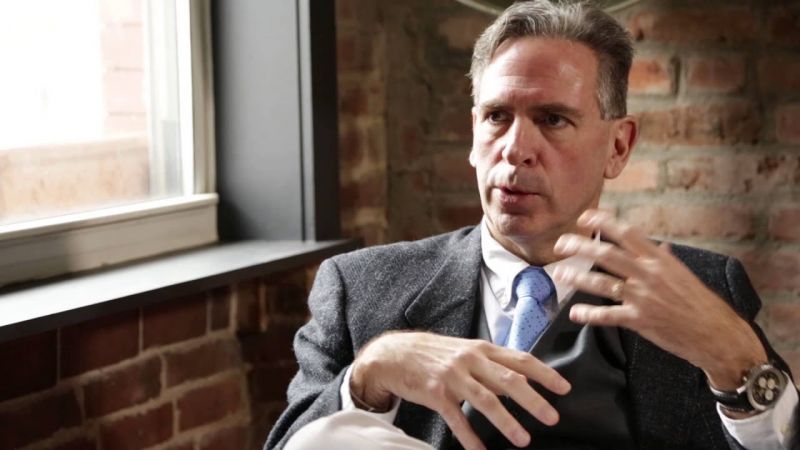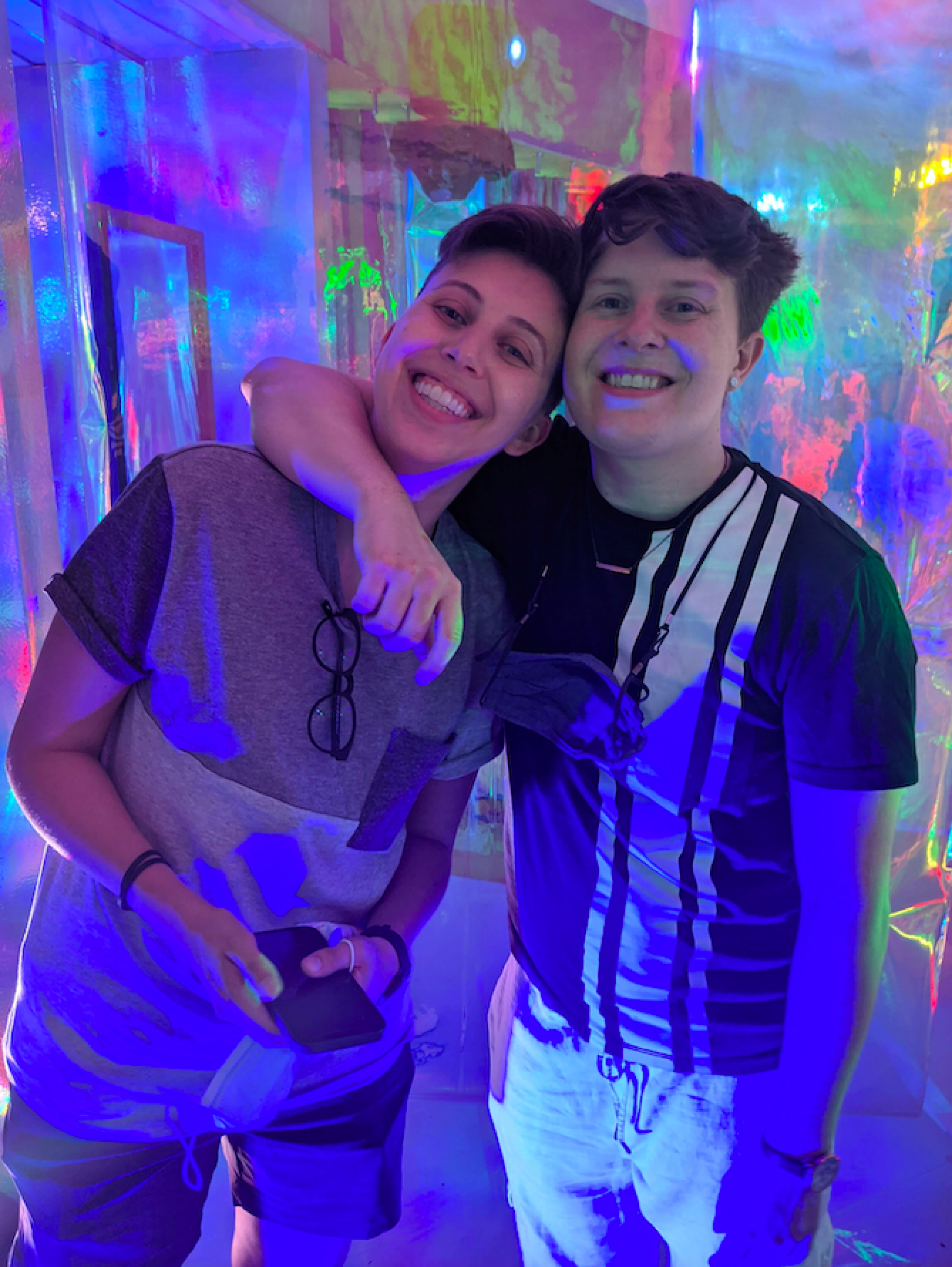Reflecting On My First Out Pride Month
What happens when OCD latches onto your identity?
Written by Liz Goslin

01 When Liz began accepting themselves as non binary and queer, their OCD started to have obsessions around their identity.
02 Stuck in mental compulsions around the coming out process, they began ERP therapy.
03 Two years later, they’ve embraced their full self in spite of intrusive thoughts, and have found support in their friends, family, and therapist.
Coming up on a year of being fully out as non binary and queer, someone asked me during Pride month if having OCD impacted my coming out process. The short answer was it did, significantly.
Just over a year ago, right after my 28th birthday, I couldn’t foresee a scenario in which I’d be out in any capacity outside of my immediate family and close friend group. Now, that feels like a lifetime ago. I can barely remember how it felt to exist as that version of myself. OCD thwarted my ability and capacity to live, but I want to remind myself and others how powerful our minds are at overcoming intense obstacles.
<>
My identity became clearly intertwined with my mental health when I started to accept that I was non binary and queer at the age of 26. I’d always struggled with the idea of being a “fraud” and doing things the “wrong way”, so it was no surprise that OCD started to feed me horrible obsessions related to my identity.
I was convinced that if I came out, my entire life would be over, and it would somehow cause a ripple effect of bad things happening to the people I care about. I was terrified of everyone in my life thinking I had maliciously hid a part of myself, and have them ridicule me for it. My OCD even told me that I was a horrible person for not knowing and accepting myself sooner, and because of that, there was no way I could ever be genuine.

Dr. Phillipson Talks Science, Symptoms & Treatment of OCD
This cycle repeated itself for months. I was in a constant state of mental compulsions that drove me to have long periods of suicidal ideation. On top of that, because of my “just right” obsessions, I was extremely regimented about the coming out process. I felt an overpowering need to make sure I confessed everything in exactly the right way with all of the necessary information. If I didn't, I thought people would be convinced that I wasn’t authentic. When I came out to my therapist, I handed her a 30 page powerpoint full of examples going back to my childhood. We joke now, over two years later, about that being a confessing compulsion in and of itself.
I am fortunate to have an incredibly gifted, kind, supportive, and fun therapist who helped guide me using the support of an exposure hierarchy. It started with imaginal exposures , such as writing and recording a story about me coming out with all my worst fears coming true, and listening to it over and over again until I habituated.
There were weeks when my exposure homework was simply to walk around Northalsted (a queer neighborhood in Chicago) and allow myself to feel the intense fear that someone would see me, know my “secrets”, and then cause my worst case scenarios to become reality.
The first time I did this, I left the area in a panic. I was convinced I had exposed myself, ruined my family’s life, and was going to be put in jail. I knew it was irrational, but I couldn’t stop the intrusive thoughts. That’s the thing with OCD — you know your thoughts make no sense, but they still feel real.
You also hide the toll they take on your mental health from everyone in your life. I have the most supportive and loving family, friends and coworkers, and rationally knew coming out would be no big deal, but I couldn’t accept the uncertainty that coming out could lead to the downfall of everything I cared about. I let fear control me for far longer than I care to admit. Even now while writing this, I’m doing a live exposure. “Maybe this is a bad idea. Maybe it will cause horrible things to happen.” But here I am, doing it anyway.

As it typically goes with ERP, deciding to fully commit causes a ripple effect. Once I started to come out to people along with doing exposures, I felt myself start to habituate to the intrusive thoughts around my identity. I also started taking Zoloft and was blown away at how much it decreased my intrusive thoughts in a short period of time.
Reading this back, a lot of what I’ve written doesn’t feel all that different from what I know many queer people struggle with: the fear of outwardly being themselves. As with any person with OCD, my brain took everything to an extreme. I spent months of my life in a compulsive loop in order to temporarily ease anxiety, convinced I would be stuck there forever.
I feel so fortunate to be on the other side of this now. I still have intrusive thoughts related to my identity, but I no longer let them control how I live my life. I am proud of who I am, and I’m grateful to have people in my life who not only love me unconditionally, but also hold me accountable whenever I slip into any type of reassurance-seeking behavior.
As cliche as it sounds, being non binary is one of my favorite things about myself. And while I would not wish the mental hell of OCD on anyone, I do believe that it has made me a more compassionate, empathetic, and stronger person. Having an incredible support system and access to mental health services and medication is something I do not take for granted. I’m grateful to be where I am and embracing my full self.
ABOUT THE AUTHOR
Liz grew up in the Midwest, Europe, and Asia. After college, they worked in New York City for three years and now work and live in Chicago. You can find them on Instagram @lizhgoslin.
Support our work
We’re on a mission to change how the world perceives mental health.



















